Related Research Articles

James Allen Whitmore Jr. was an American actor. He received numerous accolades, including a Golden Globe Award, a Grammy Award, a Primetime Emmy Award, a Theatre World Award, and a Tony Award, plus two Academy Award nominations.

Claude Aubrey Akins was a Cherokee-American character actor with a long career on stage, screen, and television. He was best known as Sheriff Lobo on the 1979–1981 television series B. J. and the Bear, and later The Misadventures of Sheriff Lobo, a spin-off series.
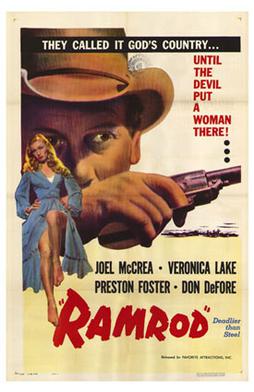
Ramrod is a 1947 American Western film directed by Andre de Toth and starring Joel McCrea, Veronica Lake, Preston Foster and Don DeFore. This cowboy drama from Hungarian director de Toth was the first of several films based on the stories of Western author Luke Short. De Toth's first Western is often compared to films noir released around the same time. Leading lady Veronica Lake was then married to director de Toth. The supporting cast features Donald Crisp, Charles Ruggles, Lloyd Bridges and Ray Teal.

The Lucky Texan is a 1934 American Lonestar Films B-movie Western film featuring John Wayne, Barbara Sheldon, Gabby Hayes, and the legendary stuntman and actor Yakima Canutt. It was written and directed by Robert N. Bradbury. It also contains a rare appearance by "Gabby" Hayes without a beard and in drag.
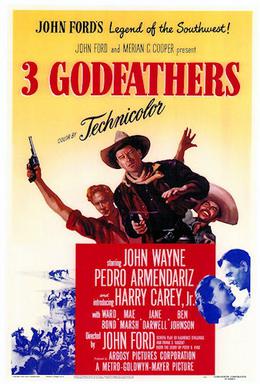
3 Godfathers is a 1948 American Western film directed by John Ford and filmed primarily in Death Valley, California. The screenplay, written by Frank S. Nugent and Laurence Stallings, is based on the 1913 novelette The Three Godfathers by Peter B. Kyne. The story is something of a retelling of the story of the Three Wise Men in an American Western context.
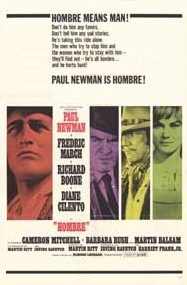
Hombre is a 1967 American revisionist Western film directed by Martin Ritt, based on the 1961 novel of the same name by Elmore Leonard and starring Paul Newman, Fredric March, Richard Boone and Diane Cilento.
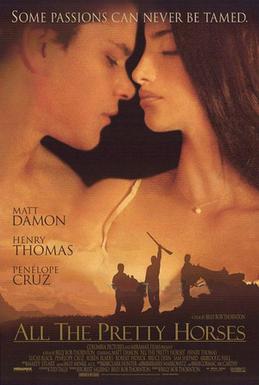
All the Pretty Horses is a 2000 American Western film produced and directed by Billy Bob Thornton, based on Cormac McCarthy's novel of the same name, and starring Matt Damon and Penélope Cruz. It premiered on December 25, 2000 to mostly negative reviews. It grossed $18 million worldwide on a $57 million budget.

Ride Lonesome is a 1959 American CinemaScope Western film directed by Budd Boetticher and starring Randolph Scott, Karen Steele, Pernell Roberts, Lee Van Cleef, and James Coburn in his film debut. This Eastmancolor film is one of Boetticher's so-called "Ranown cycle" of westerns, made with Randolph Scott, executive producer Harry Joe Brown and screenwriter Burt Kennedy, beginning with Seven Men from Now.
The War Wagon is a 1967 American Western heist film directed by Burt Kennedy and starring John Wayne and Kirk Douglas. Released by Universal Pictures, it was produced by Marvin Schwartz and adapted by Clair Huffaker from his own novel. The supporting cast includes Howard Keel, Robert Walker Jr., Keenan Wynn, Bruce Cabot, Joanna Barnes, Valora Noland, Bruce Dern, and Gene Evans. The film received generally positive reviews.

Three Godfathers is a 1936 American Western film directed by Richard Boleslawski and released by Metro-Goldwyn-Mayer starring Chester Morris, Lewis Stone, Walter Brennan, and Irene Hervey. It was adapted from the novel of the same name by Peter B. Kyne. Three bank robbers find a newborn baby and his dying mother in the desert.

Margaret Jane Blye was an American actress, also sometimes billed as Margaret Bly. She was best known for playing Michael Caine's girlfriend in The Italian Job (1969).
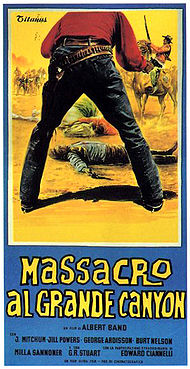
Grand Canyon Massacre is a 1964 Italian Spaghetti Western filmed in Croatia starring James Mitchum, Milla Sannoner, and George Ardisson. It was directed by Sergio Corbucci and produced by Albert Band. The film's theme song was performed by Rod Dana. The film has nothing to do with the Grand Canyon.
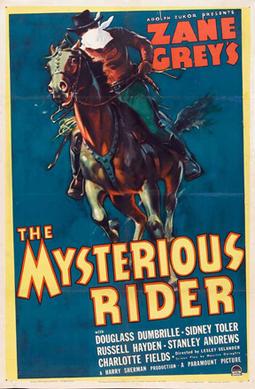
The Mysterious Rider is a 1938 American Western film directed by Lesley Selander and starring Douglass Dumbrille, Sidney Toler, and Russell Hayden. Written by Maurice Geraghty based on the 1921 novel The Mysterious Rider by Zane Gray, the film is about a notorious outlaw who returns to the ranch he once owned and takes a job disguised as a ranch hand. Unrecognized by the ranch's current owner, he waits patiently for an opportunity to expose the men who murdered his partner twenty years ago, framed him for the crime, and then stole his ranch. The film was later released for television in the United States as Mark of the Avenger.
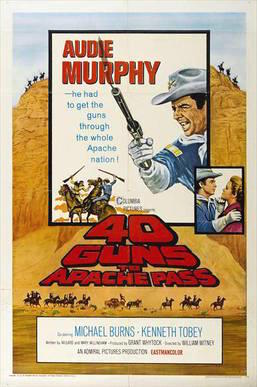
40 Guns to Apache Pass is a 1967 American Western film directed by William Witney and starring Audie Murphy.

Robert Rennick Dalton was an American outlaw in the American Old West. Beginning in 1891, he led the Dalton Gang, whose varying members included three of his brothers. They were known for robbing banks, stagecoaches and trains, primarily in Kansas and Oklahoma Territory, quickly attracting pursuit by lawmen.

Riders of the Range is a 1949 American Western film directed by Lesley Selander.

Cemetery Without Crosses, is a 1969 Spaghetti Western film by Robert Hossein, its director, co-screenwriter and star.

Scooby-Doo! Shaggy's Showdown is a 2017 direct-to-DVD animated western comedy mystery film, and the twenty-eighth entry in the direct-to-video series of Scooby-Doo films. It was released digitally on January 31, 2017, and on DVD on February 14, 2017.

Reprisal! is a 1956 American Western film directed by George Sherman and starring Guy Madison, Felicia Farr and Kathryn Grant. The film's sets were designed by the art director Walter Holscher.
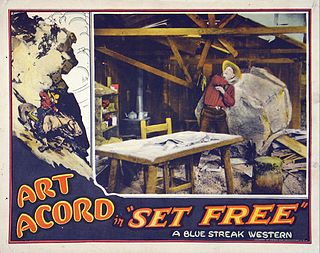
Set Free is a 1927 American silent Western film directed by Arthur Rosson and starring Art Acord, Olive Hasbrouck, and Claude Payton.
References
- ↑ "Waterhole #3 (1967)". Archived from the original on May 27, 2020.
- ↑ "Big Rental Films of 1968", Variety, 8 January 1969 p 15. Please note this figure is a rental accruing to distributors.
- ↑ "Waterhole No. 3 movie review & film summary (1967) | Roger Ebert".